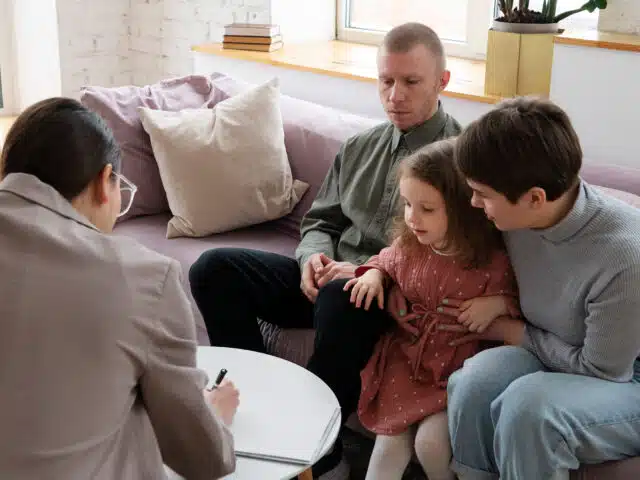The Foster Care Assessment Process
To become a foster carer, you need to prove that you can offer a suitable home.
The process shouldn’t put you off – here’s how it works.

What is the fostering assessment?
The assessment for fostering is designed specifically to ensure that you can offer a safe, loving environment for a foster child in need.
It, as you may expect, can be a little intensive. After all, you will be caring for a child – Children Always First will want to know everything about you and your close friends/family!
Don’t worry – it might sound intimidating, but it’s our job to make the process as seamless as possible. We explain every step of the way and want to hear your views. We work in partnership with Foster Carers.
See the full process here:
Step 1: Initial Enquiry
The journey into fostering begins with reaching out to us and chatting with one of our advisors to discuss whether fostering is the right fit for you.
Step 2: Social Worker Visit
At this point, your social worker will arrange a meeting with you, where they’ll conduct an interview about your life (and the lives of those around you!).
Step 3: The Matching Process
HOORAY! You have been approved! At this stage, you’ll be matched with the perfect foster child/young person for your home.
Step 4: Meeting your Foster Child!
This is the exciting bit – getting to know your foster child, introducing them to your family and helping them settle in.
The step-by-step process
Initial enquiry
Getting in touch with us is a significant step, and you might feel a bit anxious (it’s a major life decision, after all), but we’re excited to welcome you!
During this stage, you’ll engage in a conversation with one of our friendly advisors. They’ll take the time to get to know you and ask some questions to assess your eligibility as a foster carer. After this initial chat, we will arrange a home visit. It’s an opportunity for us to see where a child will live and to meet any potential partners who will be fostering alongside you.
Following the home visit, you’ll be provided with an application form. This is the start of the formal process as well as this form, following your consent we will undertake various checks and references, including a DBS check.
Social worker visit
The next step involves multiple home visits from an assessing social worker to talk to both yourself, your partner (if applicable), and any other residents or frequent visitors to the home, including any adult birth children.
These discussions cover pretty much everything. The purpose of this is to produce a detailed report about how you are suitable to foster and consider what children you would be best suited to care for – age range, personality type, et cetera. You’ll see this report and sign it off. This report is then presented with you, to the fostering panel, whose job it is to recommend whether you are able to foster. The final decision is made by the Agency Decision Maker shortly after you attend the fostering panel.
Up to this point, the fostering assessment can take about 6 months. However, it’s our job to expedite this process, so we’ll work closely with you to get things done as quickly as possible so you’re not left waiting!
The matching process
HOORAY! You have been approved!
This is a cause for celebration – not everyone gets approved, so to make it this far means that you’ve been deemed a fantastic home for foster children!
At this stage, we create a profile about you and your home and family to share with potential children that need your care and support. The placement officer will get to know you and learn about your preferences. They’ll then start matching you with your new foster child.
You have control here, ask any questions that you need. Remember, there is no such thing as a silly question in fostering: feel free to ask anything at any stage and we will do our best to answer.
Meeting your foster child!
The big day has finally come – you’re meeting your foster child!
On the day, the social worker will accompany the child/young person to your home. They’ll introduce them to you and your family (it’s good to have your biological children/partner available for the day). The social worker will stay for as long as the child needs them.
There will be a planning meeting in advance or within 72 hours after the child arrives. This is an opportunity to ensure that everyone is on the same page, and working together to support the child!
Fostering assessment top tips
On the right you’ll see our top tips for putting your best foot forward in the fostering assessment.
Top tip 1: Be yourself!
It’s okay (and very normal) to be a little bit nervous when taking the first steps on your fostering journey.
In your discussions, the social workers and other members of staff you talk to simply want to get to know what makes you tick and understand you fully.
Top tip 2: Be open and honest
Throughout the assessment process, you’ll encounter numerous questions. Some of these may feel a bit uncomfortable to answer, but it’s crucial to be completely honest at every step. Any inaccuracies discovered could potentially affect your application, so honesty is key.
Top tip 3: Get your references sorted early
You’ll need to provide three personal references during the assessment. They’ll need to be from people who know you and your parenting/caring style very well (one can be from a family member).
To avoid any delays, either get these references sorted, or prepare the referees in advance.
Top tip 4: Get excited!
You are about to change a child’s life – it’s a truly amazing thing to do, it’s definitely something to get excited about!
Your enthusiasm will be infectious and everyone in the foster assessment process will pick up on it.
Keep up to date with CAF!
Find the latest fostering news here.
Whether you’re looking for fostering tips, or you want to know what’s going on, this is the space for you!
1 of 3
Why foster with Children Always First
The benefits of CAF
24-hour support
We recognise that fostering comes with its challenges. It’s essential to us that you never feel isolated. That’s why we provide a 24-hour support line, and each household is assigned a supervising social worker for ongoing support.
Sector-leading training
We offer all of our foster carers, both new and experienced, access to extensive training specific to their needs. All training is flexible and can be delivered online or on the weekends, if necessary. It’s our job to ensure you’re ready for anything.
Dedicated youth team
Our dedicated youth workers add an extra layer of support,. Each child aged five years and over is allocated their own youth worker, who will work alongside you, mentoring and engaging with your foster child ensuring children are able to reach their full potential.
Therapeutic parenting focus
Therapeutic parenting is about creating a sense of belonging in the foster parent/child relationship. We offer support and training for any foster carer to adopt a therapeutic parenting style of parenting.
Frequently Asked Questions
How long does the fostering assessment process take?
The fostering assessment process typically takes around six months from your initial application to approval. This includes background checks, home visits, and training to ensure you’re fully prepared to welcome a child into your home.
What is the purpose of the matching process in foster care assessment
The matching process ensures that children are placed with foster families who can best meet their needs. It considers factors like the child’s age, background, and any special requirements, as well as the foster family’s experience and preferences, to create a successful and supportive experience.
What support is provided when meeting your foster child for the first time?
When meeting your foster child for the first time, you’ll receive support from your social worker, who will help facilitate introductions and provide guidance throughout the process. You’ll also have access to information about the child’s background and needs to help ensure a smooth transition.








